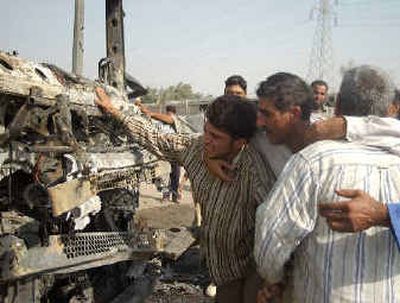Allawi vows nationwide elections

BAGHDAD, Iraq – Iraqi government officials are vowing to proceed with plans to hold nationwide elections by the end of January despite widespread doubts about whether a U.S. military campaign to recapture key cities will succeed in restoring enough stability to allow that to happen.
Prime Minister Iyad Allawi, after meeting in London with British Prime Minister Tony Blair on Sunday, reaffirmed plans for late January elections.
“The elections will be in all of Iraq, without exception. Anyone who says otherwise is mistaken,” said Farid Ayar, a member of Iraq’s Independent Electoral Commission and the group’s spokesman. “Our goal is to make the Iraqi people understand freedom.”
In Baghdad, officials say they hope the fruits of the military campaign will be evident in the next month, allowing the election plans to proceed.
But they also quietly acknowledge that failure is possible and that at least parts of the country may not be stable enough for elections by January.
If that happens, the government could be forced to proceed with elections in parts of the country and appoint government officials in the more dangerous areas, delay elections in trouble spots or delay the process nationwide. Yet veering from plans for nationwide elections promised for the end of January, and sanctioned by the United Nations, runs the risk of undermining the legitimacy of the election process, and creating more suspicion about the current interim Iraqi government and U.S. policy.
Government officials say Ramadi and Fallujah in the Sunni region and Tal Afar and Samarra in the north are the most susceptible. Samarra was hit by a car bomb on Sunday, even after a peaceful retaking of the city by U.S. forces working with local officials. In Baghdad, the area near Haifa Street, where two car bombs last week have killed more than 50 people, also is considered vulnerable.
The daily drumbeat of violence around the country appears to be worsening. In the last week, roughly 300 Iraqis have been killed, in some cases during the multinational forces’ campaign to reclaim cities.
“Because the situation has been neglected for such a long time, we are facing a mammoth task,” said Sabah Kadhim, the Ministry of Interior spokesman. “Unless the situation improves, there will be difficulties.”
The Iraqi people do not accept suggestions that elections could be held only in parts of the country, said Sadoun al-Dulame, the executive director for the Iraqi Center of Strategic Studies. Instead, they feel the election is being forced to happen prematurely.
The center polled 3,500 Iraqis nationwide to ask how likely they would be to vote if the security situation did not improve.
Preliminary findings, which will be released this week, show that people feel the process is being forced before the country is safe enough to participate.
“They are saying it’s better to delay the elections than not hold it in some places,” al Dulame said. “I don’t understand why the government insists on holding the elections under unsuitable circumstances.”
The election timetable was forced on the United States by repeated demands from Grand Ayatollah Ali al Husseini al-Sistani, Iraq’s senior Shiite Muslim cleric, for direct elections at an early date. The United Nations concluded in a report in the spring that elections would not be feasible before the end of this year, and only with much preparation and a stable security environment.
Al-Sistani stands to benefit most from elections because his Shiite followers comprise about 60 percent of the population. Violence is most severe in areas populated by the Sunni Muslim minority, which has traditionally dominated Iraq’s political system.
President Bush has also repeatedly held up the prospect of January elections, and any retreat could be seen as an admission that the situation in Iraq is less rosy than he has repeatedly portrayed it.
Al-Dulame said the center found that Iraqis did not believe the government would succeed in efforts to improve security in time for elections.
Both Allawi and his ministers have said they have crafted a security plan so the elections can be held everywhere on time.
Part of that security plan includes asking American forces to enter some areas that were considered “no-go zones” to try to reclaim those communities from insurgency – even though their hold is stronger, and violence is increasing. The Iraqi police and National Guard do not have the experience to protect those areas on their own, said Ibrahim al-Jaaferi, one of Iraq’s two vice presidents.
Kadhim said the new security plan varies from city to city, and said the government will send multinational and Iraqi forces into an area depending on what the political situation is in that city, not on a set timetable.
The result of the military re-entrance into cites overrun by insurgents has been mixed. Often when the military enters cities, it ignites fighting by insurgents, killing many Iraqis. On Friday, for example, U.S. forces launched airstrikes in Fallujah, saying they were targeting a terrorist cell. The raid killed 44 people, the Iraqi government said, including women and children. It is one of several attacks launched in Fallujah, but the city remains under insurgents’ control.
In Tal Afar, more than 100 Iraqis were killed and hundreds of thousands were temporarily displaced when U.S. forces entered the city, but U.S. forces retained control.
Al-Dulame, who was working in Ramadi Friday, said residents there were less likely to participate after seeing the impact of government-backed bombing attacks by U.S. forces, which have a more immediate impact on their lives than the activities of insurgents.
“Do you think they will participate in elections if there is blood on the street?” al-Dulame said.